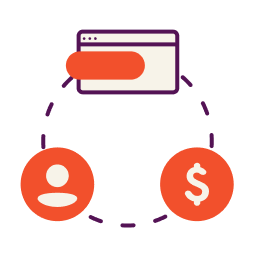There’s nothing wrong with bootstrapping things and trying to grow your business the slow and steady way. However, if you’re comfortable with the risk, applying for financing can potentially help you reach your business goals much sooner.
One way you can possibly speed up the journey to business success is by purchasing a business that has already gone through the painful start-up phase. If you’re considering this option, you’ll likely need to secure financing to pay for your new business acquisition. In other words, you’re in the market for a business acquisition loan.
What Is a Business Acquisition Loan?
A business acquisition loan is a type of financing you can use to purchase an existing business or open a new franchise. These loans can be a good solution to a number of different challenges. A business acquisition loan can help you:
- Purchase a company that is already successful
- Skip the start-up phase of building a business
- Grow your existing business by acquiring a competing company
- Open a new franchise location of an existing company
- Buy out a partner’s interest in your existing business
Finance to Purchase an Existing Business
There are actually a number of different financing options that can help you access the capital you need to achieve the goals listed above. Keep reading below for the highlights, benefits, and drawbacks of each of these options.
SBA 7a Business Acquisition Loan
Top SBA 7a Lenders:
- The Huntington National Bank
- Wells Fargo
- TD Bank
- U.S. Bank
- Chase
- Live Oak Banking Company (over $730 million funded in 2018)
The Small Business Administration (SBA) offers likely the most affordable option for small businesses that are looking for business acquisition financing. Although the SBA 7(a) loan isn’t issued solely for buying existing businesses or starting new franchises, the loan offers borrowers a lot of flexibility. It can be used for a wide range of business purposes — including business acquisition.
Flexibility isn’t the only feature that makes the SBA 7(a) loan an attractive financing option. It’s also an affordable way to borrow when you need access to business capital. Qualified borrowers can receive up to $5 million in financing with terms up to 25 years and low potential interest rates.
The SBA doesn’t issue loans directly. Rather, it guarantees the loans (or a portion of the loans) that are issued by preferred SBA lenders. Because the loan is fully or partially guaranteed, the SBA promises to cover all or part of the loan if the borrower doesn’t pay back as agreed. This backing makes lenders and financial institutions like banks and credit unions more willing to issue affordable loans that can help small businesses grow.
There is, however, a bit of a catch. If you hope to qualify for an affordable SBA 7(a) loan with attractive terms, you’ll have to jump through a few hoops first. Here’s a look at some of the requirements you will need to meet in order to qualify for this type of financing:
- You’ll have to sign a personal guarantee if you own more than 20% of the business.
- Your personal and business credit will need to be in decent shape. (Your FICO SBSS Score — a hybrid scoring model that considers your business and personal credit — needs to be a minimum of 140.)
- Cash flow (both business and personal) needs to be sufficient to prove that you can afford to keep up with the monthly payments.
- The business cannot have any red flags that would disqualify it for funding, such as:
- You’re currently delinquent on debts to the federal government (including federal student loans) or you’ve caused the government to lose money on a previous business debt in the past
- You’re incarcerated, on parole, on probation, or are currently a defendant in a criminal proceeding.
- The business operates in an excluded industry (e.g. life insurance, business that primarily make loans, pyramid-style businesses, or businesses primarily engaged in political or religious activity).
- You’re willing and able to provide the necessary documents to apply, such as:
- A Completed SBA Loan Application
- Personal Financial and Background Statements
- Business Financial Statements (e.g. Profit and Loss, One-Year Projected Financial Statement, etc.)
- Personal and Business Tax Returns for Three Years
- An Explanation of How the Loan Will Be Used to Help the Business
If you feel good about your ability to satisfy a lender’s requirements for an SBA loan, there’s one more factor you need to consider before you decide to apply. How quickly do you need the funding?
Once you submit your completed loan application package, you might have to wait several months to find out whether or not you’re approved. If you need access to capital more quickly or if you’re worried that you might not qualify for an SBA loan, you may want to consider some alternative business financing options for your acquisition loan. A popular option for a relatively quicker approval process is SmartBiz. Not only is the whole application process available online, but you’ll also be assigned a relationship manager along the way to answer any questions while you wait.
Alternative Lenders
An SBA loan is likely the most affordable small business loan you’ll be able to find, but that doesn’t make it the perfect fit for everyone. As a small business owner, it’s not always easy to qualify for a loan from a traditional financial institution like a bank or credit union.
If you can’t meet the SBA’s strict approval criteria or you’re not comfortable with the collateral requirements or other SBA loan terms, you might want to consider an alternative lender as your business acquisition funding solution.
Alternative, non-bank lenders may be willing to extend financing that can be used for business acquisitions or other business expenses. Alternative business loans typically offer easier-to-satisfy qualification requirements than traditional business financing options. Of course, the added flexibility usually comes at a cost — namely higher interest rates and fees.
There are several online lenders that offer terms that could possibly be used to acquire a business. Newtek in particular stands out with its long repayment terms and funding amounts from $50,000 to $10 million. Other online lenders such as Funding Circle and OnDeck could help, but offer shorter repayment terms, higher interest rates, and lower ceilings on what they’ll lend.
Business Acquisition Loans – Bad Credit
As a small business owner, lenders will care about more than just your business credit score and report when you apply for financing. The condition of your personal credit matters as well. This is true whether you have a start-up business, an established company, or you’re looking to acquire a business that already exists.
It’s no secret that trying to qualify for a business loan with a poor personal credit score can be a challenge. If your business credit history also contains blemishes, you’re likely to have fewer options available for financing a business purchase.
However, fewer options doesn’t mean it will be impossible for you to borrow. With a poor personal credit score, an alternative online lender may be your best bet.
Remember, it’s important that you approach any bad credit financing option with your eyes wide open. As a trade-off for loaning you money when you and/or your business represent a higher credit risk, any lending institution that approves you for financing is likely to:
- Charge you higher interest rates and fees
- Issue smaller loan amounts than you may need to acquire an existing company
- Require shorter payback terms that can lead to large monthly payments
There are several alternative online lending options available to small business owners with less-than-perfect credit, but they offer lower amounts than you’d likely need to go through with your acquisition.
If you do choose to go with a loan option designed for poor credit, just be sure you’re comfortable with the rates, repayment terms, and any other financing details of an offer before you sign on the dotted line.
Seller Financing
When you buy a business, sometimes its existing owner may be willing to offer seller financing. Seller financing is an agreement where the seller handles the loan process instead of a traditional financial institution or alternative lender.
With seller financing you typically must put up a large down payment, often 20%-50% depending upon what the seller is willing to accept. The remainder of the purchase price plus interest is paid back to the seller in agreed-upon installment payments (set forth in the loan’s promissory note). Payback terms can vary, but they often stretch out for up to five years.
Sometimes seller financing is set up using an “earn-out” method of repayment instead of fixed payments. When a seller financed loan is repaid with the earn-out method, the size of your monthly payments is based on the business’ future profits. This method can benefit the buyer when profits are low and can work well for the seller when profits are up.
Equipment Loans
Does the business you want to purchase come with existing equipment that will be a part of the sale? If so, you might be able to cover that portion of your business acquisition with an equipment loan. In fact, depending upon the type of business you’re purchasing, the majority of the purchase price could potentially be based on the value of its equipment.
On the plus side, equipment loans often feature relatively affordable interest rates, partially because the equipment itself serves as collateral for the loan. However, you’re likely to have to put up a large down payment and have strong credit to qualify for equipment financing.
If you’re searching for a lender to finance the equipment portion of your business acquisition, here are a few options you may want to consider:
How Do You Finance a Business Acquisition?
As you can see above, there are a number of options to choose from when you’re looking for the best way to finance a business acquisition — so many options, in fact, that it can be difficult to know where to start. Here’s a suggestion. Begin by trying to figure out which loans you’re likely to qualify for, based on credit and other factors. A free Nav account can be a big help here because you can check your credit and view your approval odds for dozens of business financing options in one place.
Business Acquisition Loan Calculator
Once you’ve made a list of the financing options you’re likely to qualify for, you can start ranking those options according to the features that matter most to you. These details may include:
- Interest Rate
- Fees
- Repayment Terms
- How Quickly You’ll Have Access to Business Capital
- Etc.
You can also use Nav’s free business loan calculators to compare the true cost of acquisition funding between different lenders.
Improving Your Odds
Remember that putting in the effort to establish business credit (and to get your existing credit in the best shape possible) can open financial doors for your company. Before you apply for any type of financing it’s wise to review your credit reports for errors and mistakes, pay down your credit cards, and take any other steps you can to improve your creditworthiness.
Financing a business acquisition is big endeavor. The more attractive you can make yourself and your company look to potential lenders, the better off you will be.
This article was originally written on June 7, 2019 and updated on February 2, 2021.



Just the thing(s) I was looking for. I’m on my way to where I need to be!
Thanks.